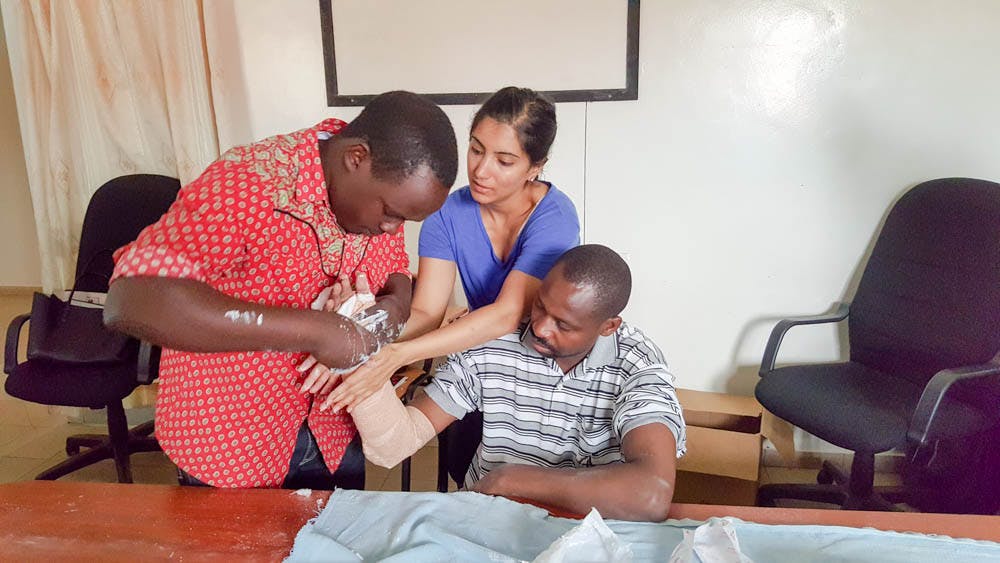In a country trying to build one of the world’s best universal healthcare systems, Rwanda has made the University one factor in its strategic plan for healthcare success.
Faculty and physicians in Warren Alpert’s Global Emergency Medicine Program are collaborating with the Ministry of Health in Rwanda and ten institutions across the United States to aid in the development of improved emergency medicine education in Rwanda. Now in its second year of operation, the program is designed to train Rwandan general practitioners and nurses in procedures and techniques to address common emergency medical needs in Rwandan hospitals, such as the University Teaching Hospital of Kigali.
Because the University offers one of the few global emergency medicine programs available in the United States, the program secured funding from the U.S. government and Ministry of Health in Rwanda to implement the training and development curriculum. “We’re very fortunate to (have funding) and approval from the Ministry of Health … (They) have a strategic plan in place to improve the (emergency medicine) workforce and increase the numbers. In the last 6-7 years, their efforts have been phenomenal,” said Naz Karim, the newly appointed director of the Global Emergency Medicine Fellowship.
The training program was not intended to make Rwandan residents continue to rely on U.S. emergency medicine physicians, but instead aimed to develop “a sustainable program run by Rwandans in the future …We’ve shifted from running the program to working alongside Rwandan colleagues in managing the program … It’s really exciting,” said Adam Levine, the former director of the program and current director of Global Emergency Medicine at Warren Alpert and director for the Humanitarian Innovation Initiative at the Watson Institute.
Unlike in the United States, where emergency medicine is a common and expected practice in hospitals, emergency medicine has not yet developed in Rwanda as a medical specialty. “Emergency medicine has only been around since the ’70s, so it’s a relatively new field,” said Catalina Gonzalez Marques, one of the four physicians selected for the two-year Global Emergency Medicine Fellowship.
Although general practitioners and nurses have worked hard to become familiar with the needs of their patients and develop methods to treat them effectively, there are still gaps of knowledge that the training program aims to specifically address. “When you go in, you have to go in with an understanding of the sociopolitics and cultural norms,” Karim said.
The three most common emergency medical cases in Rwanda involve traumatic injuries from motor vehicle accidents, infectious disease and “non-communicable” diseases like heart disease, Levine said. Traumatic injuries account for more deaths than AIDS, tuberculosis and malaria — diseases typically associated with the developing world — combined. “If you add them up, that’s 6 million deaths per year. Trauma creates a higher burden,” said John Foggle, a faculty member and Global Emergency Medicine Trauma Course facilitator for the Med School’s Division of Global Emergency Medicine, who was not involved in the training program.
Because infections are easily managed with antibiotics and since non-communicable diseases are treatable with basic medications, much of the emergency medicine program focuses on addressing trauma. In working with the Rwandan medical teams, the fellows tailored the curriculum to local needs. “We don’t just bring an intervention and leave … we see what works for them. They don’t necessarily have to learn everything in Western medicine,” said Gonzalez Marques.
The disparity in availability of expensive X-rays and CT scans has led to highly-skilled use of ultrasound by Rwandan physicians in various scenarios not immediately apparent to U.S.-trained physicians. “When (an) ultrasound is the only thing (you have), you become very good at reading them. …We were very impressed,” said Fellow Kyle Martin.
In addition to helping run training programs for medical residents in Rwanda, physicians in the Global Emergency Medicine Fellowship assisted the Rwandan medical staff in piloting their own research projects, as well as piloting other projects that can potentially be applied to other parts of the developing world.
Fellow Stephanie Chow Garbern used the University’s partnerships with biotechnology companies to develop biosensor patches for patients with sepsis — a common life-threatening condition in Rwanda resulting from infection — and a mobile app for nurses to quickly triage patients. Martin spearheaded a research program to address the high proportion of motor vehicle accidents appearing in the emergency room.
This article appeared in print under the headline "U. supports healthcare in Rwanda."





